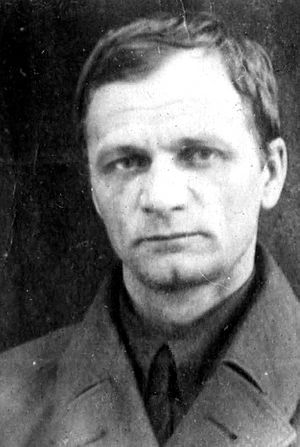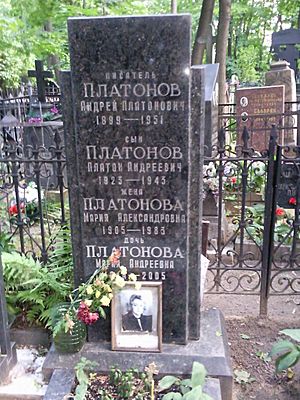Andrei Platonov facts for kids
Quick facts for kids
Andrei Platonov
|
|
|---|---|
 |
|
| Born | Andrei Platonovich Klimentov 28 August 1899 Voronezh, Voronezh Governorate, Russian Empire |
| Died | 5 January 1951 (aged 51) Moscow, Russian SFSR, Soviet Union |
| Occupation | Novelist, philosopher, playwright, poet, engineer |
| Period | 1919–1951 |
| Genre | Novel, short story, poetry, journalism |
| Notable works | Chevengur The Foundation Pit Soul "The Fierce and Beautiful World" The Potudan River "The Return" |
| Signature | |
Andrei Platonovich Klimentov (born August 28, 1899 – died January 5, 1951), known as Andrei Platonov, was a Soviet Russian writer. He was also a philosopher, playwright, and poet.
Even though Platonov considered himself a communist, most of his main books were not published during his lifetime. This was because his writings questioned some of the government's policies, like the forced collection of farms. His writing style was also very new and experimental. Some of his most famous works include the novels Chevengur (1928) and The Foundation Pit (1930).
His short stories, like "The Fierce and Beautiful World," became more widely known later. In the 2000s, more of his works were reissued, including the novella Soul (1934) and the short story "The Return" (1946).
Contents
Early Life and Learning
Andrei Platonov was born in a small area called Yamskaya Sloboda. This was near Voronezh in Central Russia. His father worked with metal on railroads and was also an inventor. His mother was the daughter of a watchmaker.
Platonov went to a local school and finished his basic education at age 13. He then started working many different jobs. He was an office clerk, a worker in a pipe factory, and helped with machines on the railroad.
After the Russian Revolution in 1917, he studied electrical technology. When the Civil War started in 1918, Platonov helped his father. They worked on trains that carried soldiers and supplies.
Starting His Writing Career
Around 1918, Platonov began writing poems. He sent them to newspapers in Moscow and other cities. He also wrote many articles and essays for local papers. These included papers for railway workers and communist newspapers.
From 1918 to 1921, he wrote a lot. He published many poems, stories, and hundreds of articles. In 1920, he started using his famous pen name, Platonov. He wrote about many different topics. These included literature, science, philosophy, and politics. It was common to see several of his articles published in the press each day.
He also joined a group of communist journalists. In 1920, he became a candidate member of the Communist Party. However, he was later removed from the Party in 1921. He said it was because he was "juvenile." He might have left because he disagreed with some new government policies. He also openly criticized local communists during a time of famine.
In 1921, Platonov married Maria Aleksandrovna Kashintseva. They had a son named Platon in 1922 and a daughter named Maria in 1944.
After a terrible drought and famine in 1921, Platonov stopped writing for a while. He decided to work on projects to bring electricity and improve land. He said he "could no longer be occupied with a contemplative activity like literature." For several years, he worked as an engineer. He helped dig ponds, drain swamps, and build a power plant.
Important Works and Challenges
Platonov returned to writing stories in 1926. Many critics noticed his unique and powerful writing style. He moved to Moscow in 1927 and became a full-time writer. He worked with several important magazines.
Between 1926 and 1930, Platonov wrote his two most important novels. These were Chevengur and The Foundation Pit. These books showed some criticism of the government's system. Because of this, they were not published at the time. They were only published in the Soviet Union much later, in the late 1980s.
In the 1930s, Platonov worked with a Soviet philosopher named Mikhail Lifshitz. In 1931, Platonov published a novella called For Future Use. This story described the forced collection of farms during the first Five-Year Plan.
The leader, Joseph Stalin, read For Future Use carefully. He did not like it and called Platonov "an agent of our enemies." Stalin suggested that Platonov and the editors should be punished.
In 1933, a government official wrote a special report about Platonov. The report said that For Future Use was "a satire on the organizing of collective farms." It also said Platonov's later works showed "deepening anti-Soviet attitudes."
Official Views on His Work
Platonov published eight more books of fiction and essays between 1937 and his death in 1951.
In 1934, another famous writer, Maxim Gorky, helped Platonov. He arranged for Platonov to join a group of writers sent to Central Asia. Their goal was to write a book celebrating ten years of Soviet Turkmenistan. Platonov's story for this book was called "Takyr." It was about a Persian slave girl who gained freedom. This trip also inspired his novella Soul (or Dzhan). This story is about an economist who helps his lost people, who have nothing but their souls. A full, uncensored version of Soul was only published in 1999.
Platonov also wrote two stories about railway workers. One was praised, but the other, "Among Animals and Plants," was heavily criticized. It was only published later in a much changed version.
Stalin's Mixed Feelings and Platonov's Son
Stalin had mixed feelings about Platonov's writing. While he criticized him, he also reportedly called him "brilliant." Platonov himself wrote letters to Stalin.
In 1938, during a time of great arrests, Platonov's son was arrested. He was 15 years old. His son, Platon, was sent to a labor camp. There, he became very sick with tuberculosis. Thanks to efforts by Platonov and others, his son was released in 1940. However, he was very ill and died in 1943. Platonov himself caught tuberculosis while caring for his son.
During World War II (1941–1945), Platonov worked as a war reporter. He wrote many short stories about what he saw at the front lines. This period brought a small improvement in his writing career. He was allowed to publish in major magazines again. Some of his war stories were well received. However, his health worsened towards the end of the war. In 1946, his last published short story, "The Return," was strongly criticized. His last published works were two collections of folk stories. He died in 1951.
His Writing Style
One of the most unique things about Platonov's work is his special language. It is often called "primitive" or "homemade."
Platonov often used a technique called "ostraneny." This means he made familiar things seem strange or new. His writing also had unusual grammar and word choices, sometimes like how children speak.
His stories often used very general words like "nature" or "space" instead of detailed descriptions. He also used many words that were common in Soviet government language, sometimes in a funny way.
In Platonov's works, his language and the story's meaning are deeply connected. His unique way of writing helps create a feeling that "everything is connected to everything."
A key theme in Platonov's work is death and how to overcome it. He was influenced by the philosopher Nikolai Fedorov, who believed in bringing the dead back to life. Platonov's characters often connect this idea with the future arrival of communism.
Legacy and Influence
Platonov has had a big influence on later Russian writers. Some of his work was published again in the 1960s and later. Because of his political writings, some people saw him as against total control by the government. The poet Joseph Brodsky called him the world's strangest writer.
In his early writings, Platonov mixed ideas about humans controlling nature with doubts about human power. He loved physical things but also feared matter. Platonov saw the world as having opposite ideas at the same time: spirit and matter, reason and emotion, nature and machines.
He wrote about factories and technology as both exciting and scary. He believed that machines could free humans from hard work. He thought this would allow people to focus on higher things in life. So, in Platonov's vision, machines were both an enemy and a savior.
Many people believe Platonov's writing is connected to earlier Russian authors like Fyodor Dostoevsky. He also used a lot of Christian symbolism. He was influenced by many philosophers, including Nikolai Fedorov.
His novel The Foundation Pit uses a mix of simple peasant language and political terms. This creates a feeling of meaninglessness, along with the strange events in the story. Joseph Brodsky thought this book questioned the meaning of language, especially political language. This idea of meaninglessness is a key part of existentialism.
The novelist Tatyana Tolstaya called Andrei Platonov "perhaps the most brilliant Russian writer of the twentieth century."
Each year, a literature event is held in Voronezh to honor Platonov. People read from his works at this event.
Tribute
A small planet discovered in 1981 was named Platonov after him.
Works
Novels
- Chevengur – 1928 (published 1972)
- The Foundation Pit – 1930 (published 1969)
- Happy Moscow (unfinished) – 1933–1936 (published 1991)
Short Stories and Novellas
- "The Motherland of Electricity" – 1926
- "The Lunar Bomb" – 1926
- The Sluices of Epifany (novella) – 1927
- "Meadow Craftsmen" – 1928
- "The Innermost Man" – 1928
- "Makar the Doubtful" – 1929
- For Future Use (novella) – 1930 (published 1931)
- The Sea of Youth (novella) – 1934 (published 1986)
- Soul, or Dzhan (novella) – 1934 (published 1966)
- "The Third Son" – 1936
- "Fro" (short story) – 1936
- "Among Animals and Plants" (short story) – 1936
- "The Fierce and Beautiful World" – 1937
- The River Potudan (collection of short stories) – 1937
- "Immortality" – 1936, 1939
- "The Cow" – 1938 (published 1965)
- "The Return" – 1946
Other Works
- Blue Depths (verse) – 1922
- The Barrel Organ (play) – 1930
- The Hurdy Gurdy (play) – 1930 (published 1988)
- Fourteen Little Red Huts (play) – 1931 (published 1988)
- Father-Mother (screenplay) – 1936 (published 1967)
English Translations
- The Fierce and Beautiful World: Stories by Andrei Platonov, 1970
- The Foundation Pit, 1973
- Chevengur, 1978
- Collected Works, 1978
- Fierce, Fine World, 1983
- The River Potudan, 1998
- The Foundation Pit, 1996
- The Return and Other Stories, 1999
- The Portable Platonov, 1999
- Happy Moscow, 2001, 2012, 2013
- Soul, 2003
- Russian Short Stories from Pushkin to Buida, 2005 (includes "The Third Son" and "The Return")
- Soul and Other Stories, 2007
- The Foundation Pit, 2009
- Russian Magic Tales from Pushkin to Platonov, 2012 (includes Platonov's folk tales)
- Fourteen Little Red Huts and Other Plays, 2016
- Chevengur, 2023
See also
 In Spanish: Andréi Platónov para niños
In Spanish: Andréi Platónov para niños
 | Georgia Louise Harris Brown |
 | Julian Abele |
 | Norma Merrick Sklarek |
 | William Sidney Pittman |


